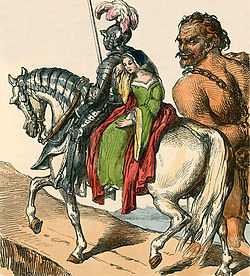Ascapart

Ascapart (also spelled Ascupart, Ascapard, Ascopard, Ascopart and Asgapard) was a legendary giant from English folklore, supposedly conquered by Bevis of Hampton, though so huge as to carry Bevis, his wife, and horse under his arm. He was 30 feet tall but the smallest of his land, and was defeated after his club (made from a whole tree) was swung at Sir Bevis and became stuck in soft ground. Rather than slaying the giant however, Sir Bevis decided to make him his Squire. Later Ascapart betrayed Bevis and took his wife Josiane, who was imprisoned with Ascapart as her jailer. For this Ascapart was killed by Bevis' friends when they freed Josiane.[1]
In later adaptations of the legend, Ascapard becomes a giant half-man half-dog and his name becomes Pelucan (also Pulicane, Pulican, Pelukan). In the Russian version of the tale, Bova Korolevich, the character becomes Polkan, a centaur.
The name Ascapard may refer to "A desert people of the near east" according to the Middle English Dictionary.[2]
Alongside the story of Bevis of Hampton, the giant appears in the local folklore of Hampshire and the New Forest; large medieval paintings of Sir Bevis and Ascupart can be found in the Southampton Bargate Monument Gallery (apparently 17th century restorations of early 14th century originals).[3]
David Foster Wallace coined the adjective ascapartic in his novel Infinite Jest, in reference to this giant.
References[edit]
- ^ Barber, Richard W. "Myths and Legends of the British Isles" Boydell & Brewer, 1999. p. 493
- ^ "Middle English Compendium".
- ^ [The borough of Southampton: General historical account http://www.british-history.ac.uk/report.aspx?compid=42036], A History of the County of Hampshire: Volume 3. Victoria County History, London, 1908. Footnote 50.
